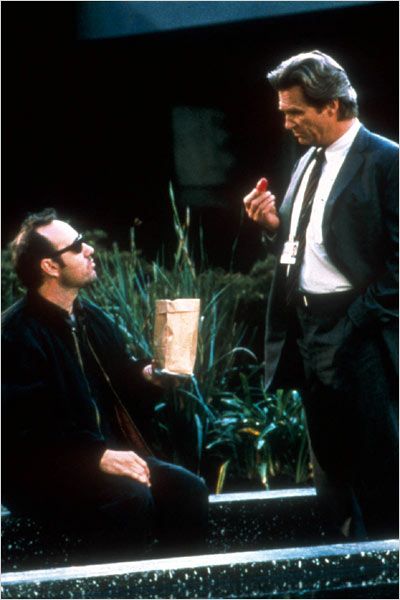From the Chicago Reader (November 2, 2001). — J.R.
K-Pax
**
Directed by Iain Softley
Written by Charles Leavitt
With Kevin Spacey, Jeff Bridges, Mary McCormack, Alfre Woodard, David Patrick Kelly, Peter Gerety, Saul Williams, and Celia Weston.
The last chapter of Robert Lindner’s best-seller The Fifty-Minute Hour, which I read when I was a teenager, was the first thing I was reminded of while watching K-Pax, a movie about a New York shrink at a psychiatric hospital (Jeff Bridges) treating a brilliant man (Kevin Spacey) who calls himself Prot and claims to come from a planet called K-Pax. In each story a psychiatrist finds himself seduced into half believing the SF projections of one of his patients, and part of the allure of that setup — like the case studies in an Oliver Sacks collection — is that we’re invited to flirt with the poetic notions behind some of its suppositions.
Based on a novel by Gene Brewer and written by Charles Leavitt, I can’t discount the undeniable pleasure of watching Spacey and Bridges act up a storm, but a lot of what makes this movie watchable and compelling is precisely what’s bogus about it: it gives in to a desire to generalize about people who are mentally ill — a group that doesn’t necessarily include Prot — and to feel satisfied and astute about those generalizations. The basic problem here is the wish to turn crazy people — or so-called crazy people — into allegorical figures, in spite of how varied they are. It’s an impulse that has underwritten such disparate movies as Shock Corridor (1963), King of Hearts (1967), and One Flew Over the Cuckoo’s Nest (1975) — all three of which, perhaps not coincidentally, were contemporary with the 60s counterculture — as well as more recent films such as the New Agey Argentinean art movie Man Facing Southeast (all of the movie buffs I know in Buenos Aires despise this 1986 movie). The value of all these films as social criticism tends to be in inverse proportion to their accuracy in depicting insane people. Shock Corridor is by far the best of the lot, but only because of what it has to say about America; as a movie about insanity, it’s flat-out ridiculous.
In principle, I’m very much behind the kind of game K-Pax is playing — a guessing game that keeps viewers in perpetual doubt as to whether what they’re watching is science fiction or not, which raises questions about whether the psychiatrist played by Bridges really knows what he’s doing as a doctor. The advantage of such multilevel ambiguity — which many movies have in the precredits sequence, when meaning is typically more open-ended and less tied to plot and character details — is that it allows this movie to take a few potshots at conventional psychiatry while exploring some of the alternative modes of thinking suggested by science fiction. Prot, for instance, declares himself a stranger to family life and says he can’t understand why humans insist on punishing one another, especially given the teachings of Jesus and Buddha.
Yet the movie can’t have it both ways, no matter how much it wants to. Insofar as it wants to be coherent, it has to make a choice about both of the leading characters — about whether Prot is an extraterrestrial and about whether his doctor knows what he’s doing — and that restricts our choices as spectators. Of course the moment the filmmakers start clearly showing that they don’t want to make a choice, the overall effect of ambiguity is blunted. The artiness of an early shot that merges the faces of Prot and the doctor in the reflections on a pane of glass alerts us to the self-consciousness of the whole enterprise.
Neither Bridges nor Spacey can be blamed for this fussy doppelganger rhetoric. Bridges does a good job of letting his middle-aged spread and middle-class conventionality contribute to our initial impression that he’s a dense therapist who plays by the book, the stooge who lets us appreciate Prot’s superior wisdom; Spacey manages to keep shifting adroitly between someone who might be an extraterrestrial and someone with a carefully buried back story. The blame falls instead on the shaky mystery-story development, which works only temporarily, and then thanks only to the spell cast by the actors. The moment one has a chance to reflect on the plot it starts coming apart at the seams.
The director, Iain Softley, has a background in TV documentaries and music videos, and his three previous features show more flair for superficial style than for substance: Backbeat, Hackers, and the popular soft-core porn adaptation of Henry James’s The Wings of the Dove, which owed at least part of its success to its ability to turn the villains of the novel into the good guys. All of his movies play better than they digest — much like music videos. K-Pax, ultimately no different from the others, keeps us fully engaged as long as it doesn’t commit itself regarding either character — a belt-and-suspenders policy that doesn’t hold up for long.





